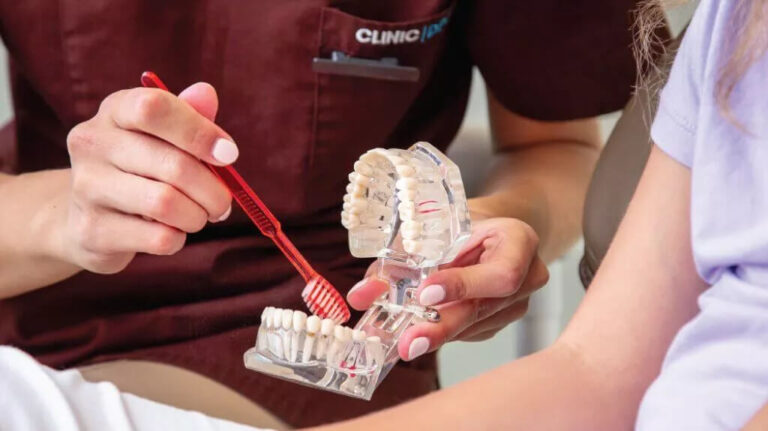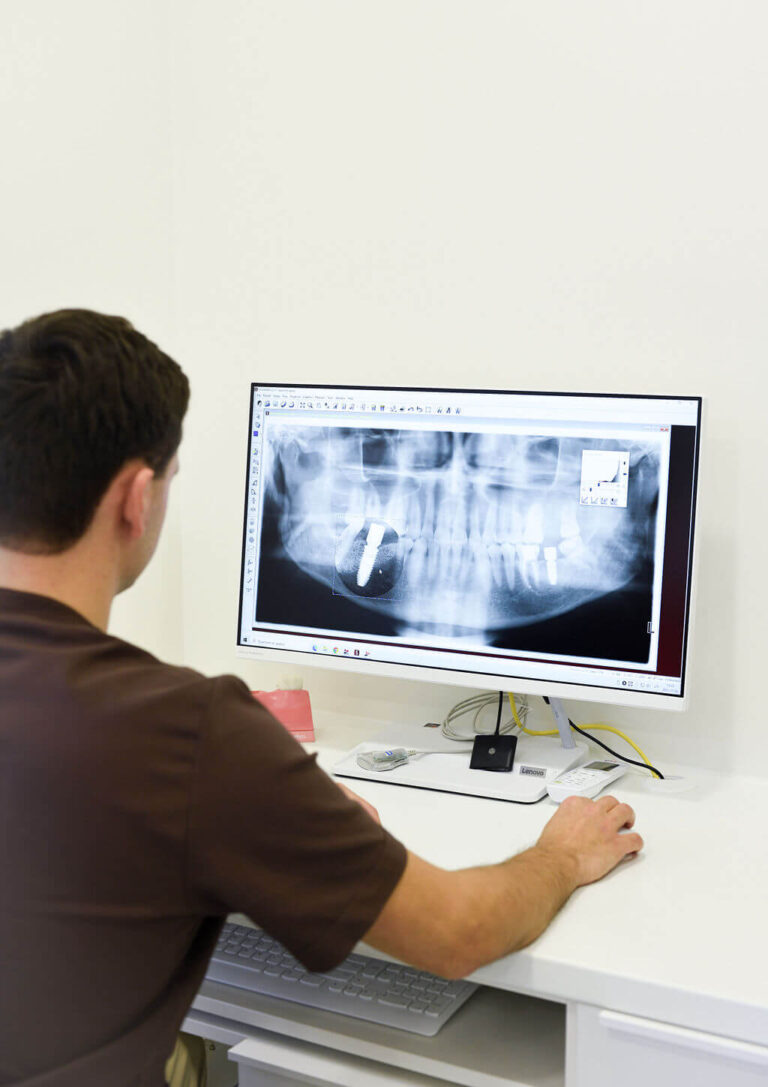A sharp toothache often signals an unpleasant disease – a root canal infection. If you feel this symptom, you should not delay, but immediately contact your doctor for root canal treatment. Gintarė Leknickė, endodontist at CLINIC | DPC, talks about this procedure.
– What causes root canal infections?
– A tooth canal becomes infected when micro-organisms enter it in any way. The causes can be varied: undiagnosed and untreated tooth decay, chipped teeth, trauma, etc. Micro-organisms (bacteria) penetrate the soft tissues of the tooth and cause inflammation in the pulp, the inner cavity of the tooth. This lesion is called pulpitis. This causes tooth pain and sensitivity. If left untreated, this inflammation spreads: bacteria enter the surrounding tissues through the root apex and cause tissue inflammation called periodontitis. If left untreated, the jawbone around the root apex of the infected tooth will eventually start to dissolve and focal areas will form. Further delays can lead to even more serious complications.
– What symptoms warn of an infection?
– Depending on the degree of damage to the pulp, a person may experience a variety of sensations in the mouth, but the most important thing to look out for is a sharp, spontaneous pain, especially in the evening or at night. Often the tooth pain is not localized and it is difficult to pinpoint which tooth is affected. Acute pain can even spread to the ear. Tooth discoloration, swollen gums and abscesses may be visible. The tooth is also characterized by increased sensitivity to cold and heat. If the bone around the root apex is damaged, the tooth may appear ‘raised’ and painful to eat, and there may be complaints of persistent pain. If the disease is chronic, symptoms are barely noticeable. There are also cases where there are no symptoms at all. It is then only after an examination and X-rays that one can tell whether endodontic treatment is needed.
– How does a root canal infection affect a person’s overall health?
– Root canal diseases have a significant impact on a person’s overall health, and a widespread infection can lead to other diseases. Studies have shown that infection in root canals can lead to cardiovascular disease, diabetes, arthritis, cancer, nervous disorders, chronic fatigue and other ailments. At the beginning of the 21st century, Professor Robert Jones, after studying 300 women with breast cancer over 5 years, found that 93% of these women had undergone root canal treatment, and in 98% of the cases, the breast cancer was on the same side of the body as the teeth with treated root canals. Furthermore, 96% of the patients had root canals treated in the upper jaw teeth. Other researchers’ studies also suggest that root canal infection of the maxillary tooth may influence the development of breast cancer or interfere with its treatment. For these reasons, it is very important that root canals are treated in time.
– What happens if treatment is delayed?
– In this case, the bacteria enter the surrounding tissues through the top of the tooth root, causing inflammation of the periodontal tissues (the tissues around the root) and bone destruction. The tooth is usually sore, painful, sensitive to biting, feels as if it has been “lifted”, and the surrounding tissues may swell. In the presence of a strong immune system and a chronic inflammatory process, there may be no symptoms. However, this does not mean that the disease does not need to be treated. Without timely medical attention, the infection only grows, the jawbone deteriorates and eventually the tooth has to be removed.
– Is root canal treatment a complicated procedure?
– This is a very responsible process that requires the endodontist to have theoretical and practical knowledge and to work diligently. The endodontist uses a microscope, various other modern devices and materials to achieve good and lasting results. Initial quality root canal treatment has a success rate of up to 90-95%. If the treatment is not carried out perfectly or if the doctor is contacted late, secondary caries may form under the filling and re-inflammation may occur. Root canal treatment is then required. Particularly teeth treated 15-20 years ago, with less suitable and biocompatible filling materials and inadequate radiographic diagnosis and control, require a lot of re-treatment.
– What is root canal treatment?
– This is a re-treatment of canals. It is usually needed when the patient has pain, swelling, an abscess near the tooth, and an X-ray shows a non-healing inflammation at the root apex. It may also be necessary to re-treat the tooth before it can be replaced.
The aim of the treatment is to remove the old filling material, to instrument the root canals if possible, often to correct complications from previous treatments and to disinfect and seal the root canals.
We urge you to see a doctor as soon as you feel a toothache, which will make the treatment easier and less likely to require re-treatment. Don’t let problems take root – it will be cheaper, faster and more comfortable.






